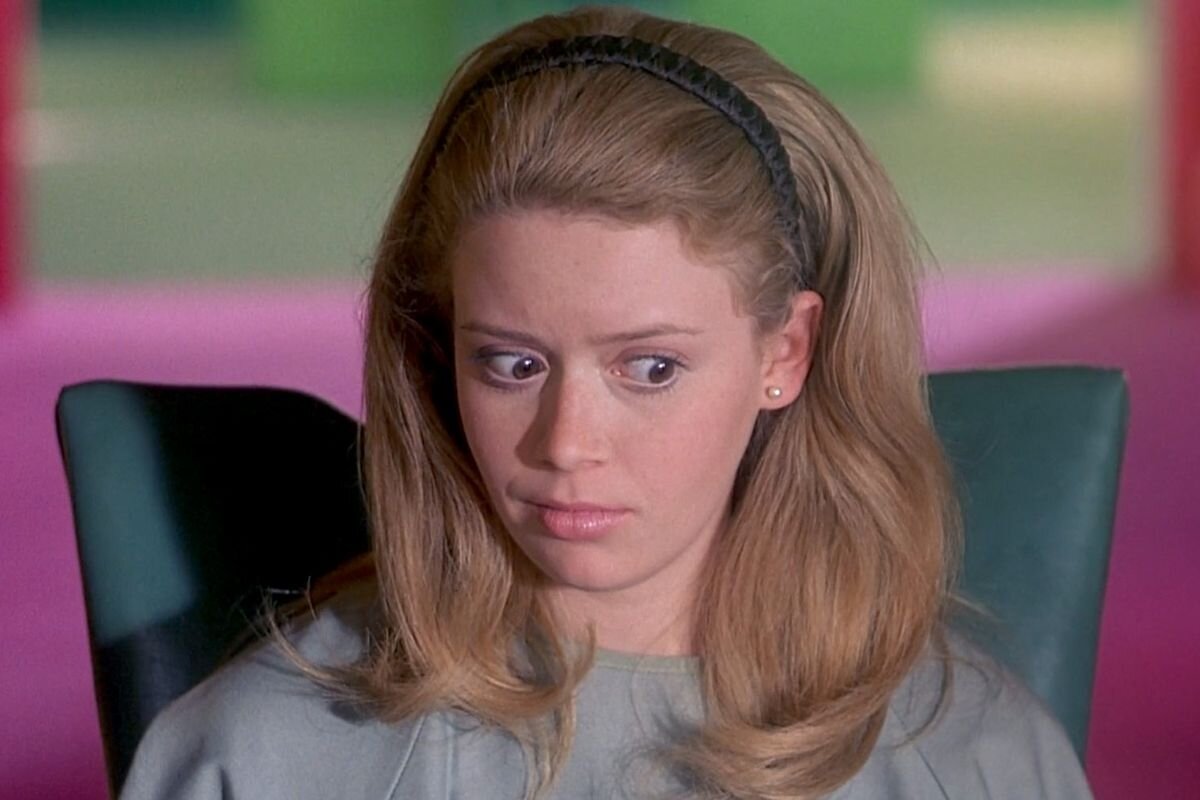But I’m A Cheerleader: Director’s Cut of Cult Comedy Still Campy If Dated on Gay Themes
By Liam Lacey
Rating: B-
It was with some surprise that I received an email from Los Angeles, noting that in 2000, I had reviewed the comedy But I’m A Cheerleader, starring a young Natasha Lyonne as a teen sent to a gay “conversion” camp. Would I care to see this cult classic in a new Director’s Cut for its 20th anniversary?
My reaction was, did I see that? After recovering my original review from the library, I remembered why I found it unmemorable. My review was typical: A 4.6/10 average rating on Rotten Tomatoes and 39/100 on Metacritic. Was I wrong?
Natasha Lyonne in But I’m a Cheerleader.
Directed by the 29-year-old Jamie Babbit and written by Brian Wayne Peterson, the indie film stars Lyonne as Megan, a teenaged cheerleader who fantasizes about the hot orange panties and bouncing shirt-fronts of her fellow squad members but hasn’t identified as lesbian.
However it is obvious to her frumpy Christian parents (Bud Court and former Andy Warhol star Mink Stole) because of Megan’s vegetarian diet, female pinups on her wall, and lack of enthusiasm for having her boyfriend’s tongue down her throat.
After an intervention, Megan is shipped from her muffin-brown home to the True Directions deprogramming camp for queer teens run by a Jesus-loving, pink-suited dictator named Mary Brown (Cathy Moriarty) and "ex-gay" gym instructor Mike, played by RuPaul.
The camp requires that girls dress in pink and the boys in blue in a nursery-prison institution. Miss Brown trains the girls in heteronormative behaviour like diapering babies and vacuuming, while Mike puts the feminine-acting boys through a regimen of chopping wood, throwing footballs, and grabbing their crotches.
As a final lesson, they’re paired up for a clothed simulation of missionary-position sex. (“Foreplay is for sissies,” advises Miss Brown. “Real men go in, unload, and pull out!”) Instead of being cured, of course, Megan falls for the sultry, rebellious cigarette-smoking bad girl named Graham (Clea DuVall) and discovers true lust and love.
A generation later, the negative critical consensus has shifted. The film shows up on online lists of top LGBTQ films and was even featured on the prestigious Criterion Channel. An accompanying article informed us that in the “vastly different” context today, in the wake of the widespread American legalization of same-sex marriage and prohibitions against gender discrimination, Cheerleader was “transgressive and ahead of its time.” In a 2018 essay in Refinery29, writer Anne Cohen also contends the film was ahead of its time while “tone-deaf” mostly male critics, just didn’t get it.
PROUDLY SUPPORTS ORIGINAL-CIN
It’s great people are enjoying the film though I disagree with the interpretation of the original reaction. In 2000, Cheerleader was the opposite of progressive, a stereotype-infested, warmed-over John Waters without the outrageous edge. Rita Kempley, for example, in The Washington Post, called it “hopelessly dated and not as campy as the filmmakers think.” Jan Stuart of The Advocate, the national gay and lesbian newsmagazine, called the film “numbingly crude” with an attempt at subversion “so limp, you are tempted to turn in your gay irony credentials altogether.”
The film still comes across as forced and amateurish though, like mid-century furniture, it has developed a patina of character with age. So, here are three (not too loud) cheers for what Cheerleader did accomplish.
One: It’s a happy gay romantic comedy, long before TV’s Glee and Love Simon (2018). Compared to serious contemporary movies on the barbaric practice of sexual orientation conversion therapy — see The Miseducation of Cameron Post and Boy Erased — Cheerleader is irrepressibly flippant.
Two: From a distance of 20 years, the movie stands as a same-sex alternative to a flurry of commercial teen dramas released around the same time. Now, it turns out to be one of those see-them-before-they-were-famous movies: Michelle Williams plays a fellow cheerleader who rats Megan out; French star Julie Delpy, credited as “Lipstick Lesbian,” has a cameo as a woman at a gay bar, and future mumblecore star Melanie Lynsky plays a dour fellow teen inmate. Then there’s a rare not-in-drag performance by RuPaul. DuVall has subsequently guested on Rupaul’s Drag Race.
Three: Clearly, Cheerleader was a breeding ground for better lesbian-positive television dramedies and films to come. Most prominently, Lyonne went on to star in the television prison series Orange Is The New Black and co-created, wrote, and directed the excellent Russian Doll (director Babbit, an in-demand television director, also worked on that series.) DuVall, after a lot of film and television work, has also emerged as a filmmaker who co-wrote and directed this year’s star-packed holiday LGBTQ comedy Happiest Season with Mackenzie Davis, Kristen Stewart, Dan Levy, and Audrey Plaza. So, yay team for all that.
But I’m A Cheerleader. Directed by Jamie Babbit. Written by Brian Wayne Peterson. Starring Natasha Lyonne and Clea DuVall. The 20th Anniversary Director’s Cut, which includes the director’s audio commentary and three featurettes including the But I’m A Cheerleader Class Reunion, is now available on AppleTV and iTunes. But I’m A Cheerleader, original version, is available on Prime Video.



